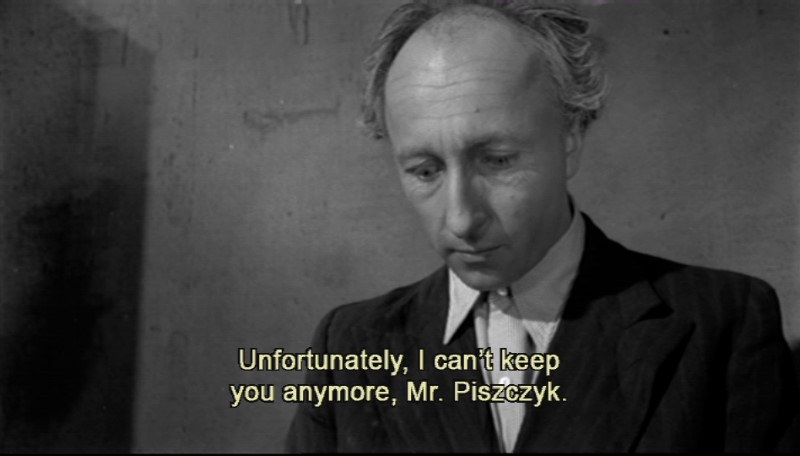Similar to another Czech New Wave film, Closely Watched Trains, Bad Luck is a coming of age story with a somber conclusion. An older Jan Piszczyk retrospectively narrates his life story from boyhood, in the form of flashback, to the present moment where we see him in what seems to be a job interview. This interview scene becomes the film's framing device. We are introduced to Piszczyk's fate from the very beginning and gradually throughout his story, we begin to realize what has become of him, which is that he is confessing his "bad luck" in order to gain sympathy from the prison authority, who then, as he wishes, might let him stay in prison: the only place Pisszczyk feels safe from misfortune. Piszczyk, unfortunately for him (literally), is released from prison which then leaves the audience feeling the cynicism Munk himself expresses towards communist fascism since his safety can only be secured in prison.

His ultimate conviction as a result of bad luck is interesting when considering the persecution of artists during the strict period of censorship. Much like the choices a Polish artist during the 50s must face, Piszczkyk takes the audience through the implications of self-actualization within society versus that in prison. Piszczyk demonstrates life as a free man admiring various persona's within the society around him and recreating himself in these images. As a result of his genuine curiosity and enthusiasm for everything from activism in both the anti-communist league and the student nationalist group, to wearing a soldier's uniform regardless of the ideological slant it implies, he gets penalized precisely because of his curiosity and enthusiasm.
At the point when Piszczyk is amoung the prisoners of war, Munk frames the shot so that Piszczyk and his admirable soldier friend fill the entire scene. We see Piszczyk on one half and the friend in reversed symmetry on other half as if Piszczyk's image was copied from the man's image, dragged over to the right of the screen, and pasted. Pyszczyk imitates the friend down to the very nuances of his body language which emphasizes Piszczyk's devoted attention to authentic imitation. An artist working to organize layers of chaotic biases into some kind of objective beauty, or unifying societal mirror (an authentic imitation of sorts), faces situations which bar him or her from ingenuity because her product risks exposing the corruption that adheres the pillars of any given institution. Piszczyk is less artistic than a filmmaker per se but his goals are often aesthetic, like when he puts on the military uniform in order to see how his image looks in the mirror, or with passionate motivations, like when he joins student political movements to gain attention from girls. An artist may create a film that is plenty reserved from political commentary; like Polanski's Knife in the Water which was released four years later and criticized by the Polish commission of culture for having no social value. Piszczyk turns to the camera and asserts his innocence to the men convicting him of Nazi espionage, " Pretending? The whole time, I did my very best!" He becomes a mouth piece for innocent achievements by filmmakers and other artists when creating genuine art but are convicted for obscenity, frivolity, western ideological sublimation, etc. All the while, Munk preserves a somewhat positive outlook because of the comedy and entertainment value of such a depressing situation.
Piszczyk's quirks brings sunshine to an otherwise dark situation. At several moments, we see Piszczyk face-to-face with adversity, like at the point when he is framed for vandalizing the poster of the company's director. His initial response to overt forces arbitrarily against him, from his perspective, is a hilarious twitch. Munk creates an entertaining philosophical chiaroscuro with the comedic portrayal of his protagonist's somber fate.

No comments:
Post a Comment